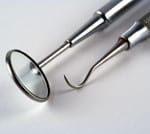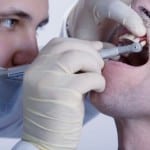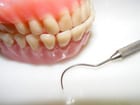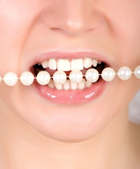 Gum disease is the UK’s major reason for tooth loss in adults. However, it is a preventable problem and one that can be successfully treated if it’s caught soon enough.
Gum disease is the UK’s major reason for tooth loss in adults. However, it is a preventable problem and one that can be successfully treated if it’s caught soon enough.
The signs of gum disease
The main signs of gum disease include bleeding gums and gums that are swollen, red and/or tender. The gums may appear to be pulling away from the teeth and you might persistently experience a bad taste in the mouth. A tooth or number of teeth could feel loose and your bite may have changed as well.
Causes of gum disease
Gum disease is primarily caused by dental plaque that has been allowed to build up around the gum line.The bacteria found in plaque produce a form of acid and other toxins which begin to eat away the gum tissue. If left untreated the acid will eventually begin to eat away the teeth and the underlying jaw bone. This is why it is important to brush twice daily and floss every night.
What treatments can be used to cure gum disease?
Stage 1 Treatment:
In the very early stages your dentist might suggest that you improve your oral hygiene routine. The following may be suggested to you: begin to brush your teeth and gums for 2 to 3 minutes twice daily and flossing every night. If possible use an electric toothbrush as these remove more plaque than a manual one and use an antiseptic mouthwash. This form of treatment may well be enough to cure the problem.
Stage 2 Treatment:
A professional scale and polish may be the next step as this will ensure that all plaque and tartar is removed. It will also include cleaning under the gumline, which should remove the problem plaque and cure the infection.
Stage 3 Treatment:
In some cases of gum disease ‘root planning treatment’ is required. This is essentially a deep clean which gets below the gum line and under the teeth to the roots. This is done under local anaesthetic and patients may feel some discomfort for a few days after the treatment. However, this can be soothed with over the counter painkillers.















